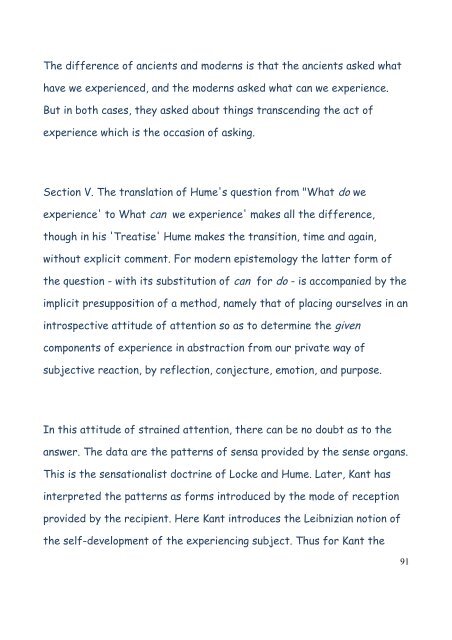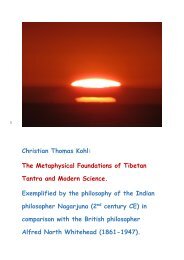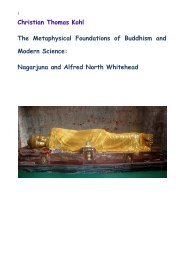Christian Thomas Kohl The Metaphysical Foundations of Buddhism and Modern Science
Christian Thomas Kohl The Metaphysical Foundations of Buddhism and Modern Science
Christian Thomas Kohl The Metaphysical Foundations of Buddhism and Modern Science
You also want an ePaper? Increase the reach of your titles
YUMPU automatically turns print PDFs into web optimized ePapers that Google loves.
<strong>The</strong> difference <strong>of</strong> ancients <strong>and</strong> moderns is that the ancients asked what<br />
have we experienced, <strong>and</strong> the moderns asked what can we experience.<br />
But in both cases, they asked about things transcending the act <strong>of</strong><br />
experience which is the occasion <strong>of</strong> asking.<br />
Section V. <strong>The</strong> translation <strong>of</strong> Hume's question from "What do we<br />
experience' to What can we experience' makes all the difference,<br />
though in his 'Treatise' Hume makes the transition, time <strong>and</strong> again,<br />
without explicit comment. For modern epistemology the latter form <strong>of</strong><br />
the question - with its substitution <strong>of</strong> can for do - is accompanied by the<br />
implicit presupposition <strong>of</strong> a method, namely that <strong>of</strong> placing ourselves in an<br />
introspective attitude <strong>of</strong> attention so as to determine the given<br />
components <strong>of</strong> experience in abstraction from our private way <strong>of</strong><br />
subjective reaction, by reflection, conjecture, emotion, <strong>and</strong> purpose.<br />
In this attitude <strong>of</strong> strained attention, there can be no doubt as to the<br />
answer. <strong>The</strong> data are the patterns <strong>of</strong> sensa provided by the sense organs.<br />
This is the sensationalist doctrine <strong>of</strong> Locke <strong>and</strong> Hume. Later, Kant has<br />
interpreted the patterns as forms introduced by the mode <strong>of</strong> reception<br />
provided by the recipient. Here Kant introduces the Leibnizian notion <strong>of</strong><br />
the self-development <strong>of</strong> the experiencing subject. Thus for Kant the<br />
91


















